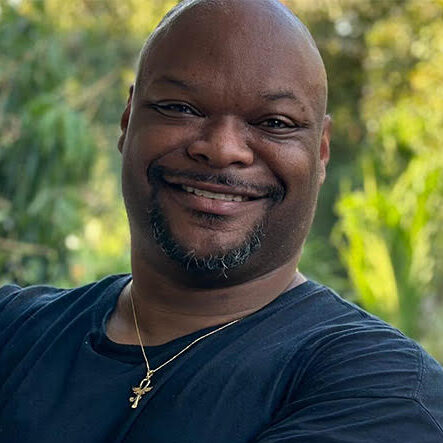

Consent Is Sacred: Reimagining Ethics in Marginalized Research Contexts
Consent as more than paperwork—it’s power, care, and collective agreement. This session moves beyond institutional forms and IRB checkboxes to explore consent as a sacred, ongoing, and co-regulated process. Using real case studies and trauma-informed frameworks, participants will examine how consent practices in research marginalized and underserved communities an either replicate harm—or create healing. We will conduct a deep dive into complex topics like coercion, re-consent, data withdrawal, and dignity-based refusal.

By the end of this session, participants will be able to:
-
Define layered consent and identify power dynamics in research participation.
-
Apply trauma-informed principles to consent design and communication.
-
Assess when and how consent must be renegotiated to maintain ethical integrity.

Presenter: Dr. Kaston Anderson Jr.
Dr. Kaston Anderson Jr. is an associate professor in the Department of Psychology at Michigan State University; his PhD is in behavioral psychology, and he has master’s degrees in public health, experimental psychology, and applied behavior analysis. Dr. Anderson is a community-engaged scholar and community advocate, and he directs the ACES Research Collective (ARC). His research aims to advance health equity and well-being for marginalized and underserved populations, including LGBTQ+ and kink involved populations.
Website: https://www.kastonandersonjr.com/


Continuing Education Credit
The complete event of 1.5 hours is eligible for 1 APA and 1 AASECT CE units.
American Psychological Association continuing education credit
TASHRA is approved by the American Psychological Association to sponsor continuing education for psychologists. TASHRA maintains responsibility for this program and its content.
Many states honor APA CE credits for other licensed health professionals, please check with your own state licensing board.
This program addresses Curriculum Content standard 1.1,
Program content focuses on application of psychological assessment and/or intervention methods that have overall consistent and credible empirical support in the contemporary peer reviewed scientific literature beyond those publications and other types of communications devoted primarily to the promotion of the approach
American Association for Sexuality Educators, Counselors and Therapists continuing education credit
This program meets the requirements of the American Association of Sexuality Educators, Counselors and Therapists (AASECT) and is approved for 3 CE credits. These CE credits may be applied toward AASECT certification and renewal of certification. Completion of this program does not ensure or guarantee AASECT certification. For further information please contact [email protected].
The Core Knowledge Area addressed in this webinar is:
Diversities in sexual expression and lifestyles, i.e. polyamory, swinging, BDSM, tantra
Sexual exploitation, including sexual abuse, sexual harassment, and sexual assault
Range of sexual functioning and behavior, from optimal to problematic
Sexuality Education (SE) Skills Training
Approaches to sexuality education with specific populations
Sexuality Counseling (SC) Training
Theory and methods of different approaches to intervention in relationship systems.
Sex Therapy (ST) Training
Theory and methods of approach to intervention in relationship systems experiencing sex and intimacy problems.

Group Rates and Scholarships
Group Discount Rate:
Tiered
minimum group size: 4
Group size: 4-9 10% off registration for each person
Group size: 10 or more, 15% off registration for each person
For more info or to ask questions, please contact [email protected]
Scholarship
Application: https://docs.google.com/forms/d/e/1FAIpQLSer0jnLFpFLHv8U0Ysfy6Z2dtlSpBTmWDe8c-IAPlwE2B-eUg/viewform
Why do you want a scholarship for this training?
Do you currently work with kinky clients/patients?
Do you intend to specialize in serving the kink community?
Scholarship covers 50% of registration. Scholarship is available for all tiers (CE, AASECT, and Community Member).
Clinical Training Team approves 3-6 scholarships per training depending on level of registration and the types of tickets being requested.
Deadline for applying is one week before training
Only one scholarship per calendar year per participant
Scholarship prices are sent as invoices via PayPal, not as discount codes on the website. These should be sent 1-week before the training begins.

Cancellation Policy and Grievance Policy
Cancellation Policy
You may cancel up to ten days before a scheduled workshop without penalty and receive a credit for another workshop or a refund minus $7 for processing costs. If you cancel less than ten days before, you will be responsible for payment. TASHRA reserves the right to cancel any event that does not meet our minimum registration within 4 business days of the class. If TASHRA cancels an educational event, you will receive a credit toward another workshop.
TASHRA Grievance and Complaint Policy
TASHRA is committed to conducting all activities in compliance with the American Psychological Association’s (APA) Ethical Principles of Psychologists and the American Association of Sexuality Educators, Counselors and Therapists (AASECT) Code of Conduct. TASHRA will adhere to all legal and ethical responsibilities to be nondiscriminatory in promotional activities, program content, and the treatment of program participants. Monitoring and assessment of these standards will be the responsibility of the TASHRA Clinical Training Team ([email protected]).
While TASHRA makes every attempt to assure fair treatment for all participants, occasionally complaints will arise about continuing education programs. This does not include complaints or comments received on course evaluations.
The person with a grievance will first try to informally resolve their grievance by contacting TASHRA with the issue concerning the training, its delivery, the evaluation method, technological issue, other attendee(s), and/or any other concern.
When a participant files a complaint, either orally or in written format, and expects action on the complaint, the following actions and procedures will be taken:
- If the grievance concerns a speaker, the content presented by the speaker, or the style of presentation, the individual making the complaint will be asked to put his/her comments in written format. The Professional Development Services Manager will then pass the comments on to the speaker, assuring the confidentiality of the complainant.
- If the complaint concerns a workshop offering, its content, level of presentation, or the facilities in which the workshop was offered, Professional Development Services Manager will mediate and attempt to resolve the complaint promptly. If the participant requests action, the Professional Development Services Manager is empowered to:
- Attempt to move the participant to another workshop, or
- Provide a credit for a subsequent year’s workshop, or
- Provide a partial or full refund of the workshop fee.
- Actions 2b and 2c will require a written note, documenting the grievance, for record keeping purposes. The note need not be signed by the grieved individual.
- If the complaint is made after the program has occurred or concerns the TASHRA CE programming more generally, the Professional Development Services Manager will address it as follows:
- Request that the complainant submit a written complaint and propose an appropriate remedy.
- Provide the instructor(s) with the opportunity to respond to the complaint and propose an appropriate remedy,
- Review these documents, make a final determination, and decide on any remedy.
- TASHRA’s Clinical Training Committee will then consult regarding this grievance in an effort to find fair methods of resolving the grievance.
- If the aggrieved person is not satisfied with the solutions put forth, then they may put their grievance in writing and contact the American Association of Sexuality Educator, Counselors, and Therapists (AASECT). The appropriate AASECT personnel can be reached at [email protected].
- TASHRA will abide by any decisions made by the APA or AASECT regarding resolution of the grievance.
For further information, contact Zita at [email protected].

